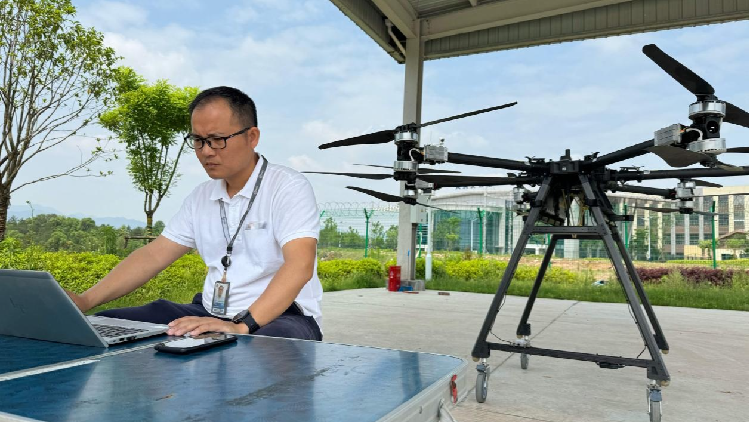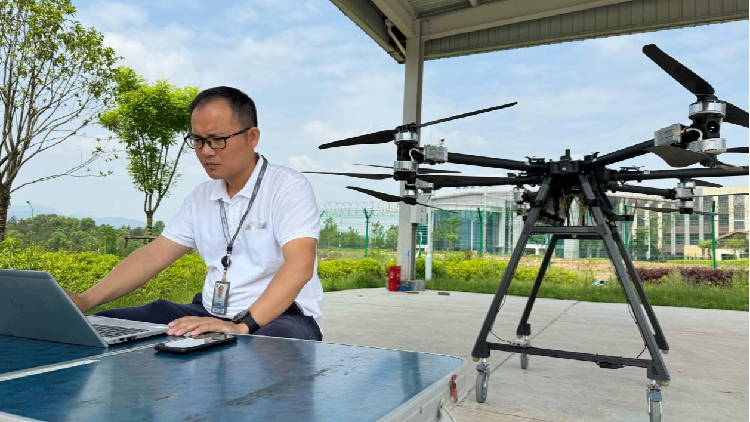Drone operators help boost low-altitude economy


<img src='https://news.cgtn.com/news/2024-09-07/Drone-operators-help-boost-low-altitude-economy-1wHR3Qd1udq/img/3a003feed9e44a019ffe2bbaef53edbe/3a003feed9e44a019ffe2bbaef53edbe.png' alt='Drones transporting tea from a plantation in Ganzhou City, east China's Jiangxi Province. /CMG'
Editor’s note: CGTN presents “New Trends,” which explores new trends among Chinese people as well as their underlying causes. We focus on the impacts of China’s reform and opening up, emphasizing the modernization strategies outlined by the Third Plenary Session of the 20th Central Committee of the Communist Party of China. This era of transformation, driven by new productive forces, is reshaping Chinese people’s lifestyles and daily experiences, blending tradition with innovation to redefine how they live and work.
Zhou Guojun, a drone operator in east China’s Ganzhou City, is used to operating multiple drones to transport tea from plantations on different mountainous areas in the city to tea-processing factories during the tea picking period.
The use of drone transportation improves the transportation efficiency, ensures the freshness of tea from picking to processing and reduces the damage rate of tea, Zhou said.
It’s not coincidental for Zhou to become a drone operator. Zhou, who has long dreamed of flying, got to know of the drone industry in 2016. Then he made use of his spare time to learn about drone operating and passed the civil unmanned aircraft operator license (Class IV).
During work, Zhou is always staring at the ground station interface on the screen with fingers habitually falling on the keyboard, so that he can make emergency adjustments at any time.
“During the rainy season when the weather is more changeable, I have to make emergency responses based on safety assessment, such as returning along the original route or making a landing at a nearby place,” Zhou said. Zhou has operated drones to complete many other jobs other than transporting teas. Speaking of transporting blood one time, Zhou said he felt his job was worth it as it only took 10 minutes instead of a normal one hour to transport blood.
Though operating drones seems cool for outsiders, Zhou felt he dares not make any mistakes because even a minor mistake could make the flight unsafe.
“We need to keep an eye on the ground operating system. Staring down all day, my eyes will unconsciously tear because we are not only operating one drone, but often several or dozens of them, and the details of each drone must be closely watched,” Zhou added.
<img src='https://news.cgtn.com/news/2024-09-07/Drone-operators-help-boost-low-altitude-economy-1wHR3Qd1udq/img/c05947d5a8f8467ca5a64e2ea022c0c0/c05947d5a8f8467ca5a64e2ea022c0c0.png' alt='Zhou Guojun operates a drone on a computer. /CMG'
Nowadays, more and more youth have joined the drone industry like Zhou, such as aerial photography, pesticide spraying and delivery. Besides, in the wave of new technologies such as 5G, artificial intelligence and big data, the application field of drones continues to expand.
Data released by the Civil Aviation Administration of China (CAAC) showed that by the end of 2023, a total of 194,400 people had drone operator licenses, an increase of 56,000 from the previous year. And by the end of 2023, there were 95 examination sites for people who apply for drone operator licenses in China, of which 30 were newly added in 2023, an increase of 31.5 percent over the previous year.
Zhang Bing, director of the Air Transport Institute at the China Academy of Civil Aviation Science and Technology, told China Media Group that drone operators have developed rapidly in the past five years and have better prospects amid the booming low-altitude economy.
At present, the CAAC has issued relevant training courses and licensing requirements for drone operators, Zhang said, adding that “so this industry can be said to be relatively standardized and its development in turn can also promote the safety of our entire industry system.”
Noting many colleges and universities have set up courses or majors in relevant to the drone application industry, Zhou said that indirectly shows that the country nowadays needs this kind of professional talent like drone operators.
“We also need to continuously increase the knowledge reserve and pay more attention to the update and iteration of new models and new technologies,” Zhou added.

